Related Research Articles
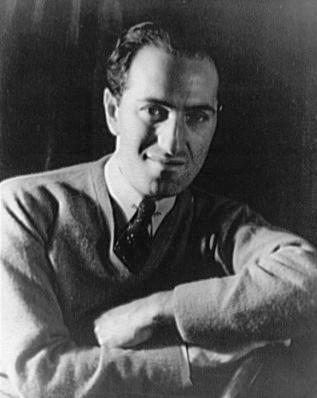
George Gershwin was an American composer and pianist whose compositions spanned popular, jazz and classical genres. Among his best-known works are the orchestral compositions Rhapsody in Blue (1924) and An American in Paris (1928), the songs "Swanee" (1919) and "Fascinating Rhythm" (1924), the jazz standards "Embraceable You" (1928) and "I Got Rhythm" (1930), and the opera Porgy and Bess (1935), which included the hit "Summertime".

Ira Gershwin was an American lyricist who collaborated with his younger brother, composer George Gershwin, to create some of the most memorable songs in the English language of the 20th century. With George, he wrote more than a dozen Broadway shows, featuring songs such as "I Got Rhythm", "Embraceable You", "The Man I Love" and "Someone to Watch Over Me". He was also responsible, along with DuBose Heyward, for the libretto to George's opera Porgy and Bess.
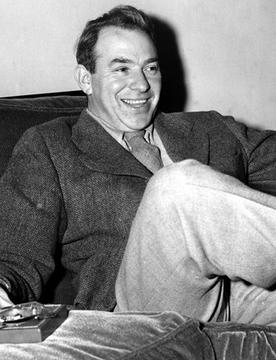
Edgar Yipsel Harburg was an American popular song lyricist and librettist who worked with many well-known composers. He wrote the lyrics to the standards "Brother, Can You Spare a Dime?", "April in Paris", and "It's Only a Paper Moon", as well as all of the songs for the film The Wizard of Oz, including "Over the Rainbow". He was known for the social commentary of his lyrics, as well as his leftist leanings. He championed racial and gender equality and union politics. He also was an ardent critic of religion.
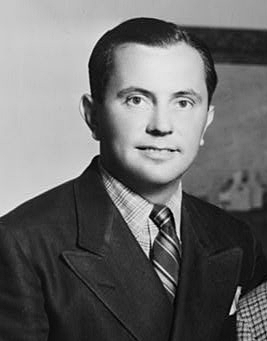
Vernon Duke was a Russian-born American composer and songwriter who also wrote under his birth name, Vladimir Dukelsky. He is best known for "Taking a Chance on Love," with lyrics by Ted Fetter and John Latouche (1940), "I Can't Get Started," with lyrics by Ira Gershwin (1936), "April in Paris," with lyrics by E. Y. ("Yip") Harburg (1932), and "What Is There To Say," for the Ziegfeld Follies of 1934, also with Harburg. He wrote the words and music for "Autumn in New York" (1934) for the revue Thumbs Up! In his book, American Popular Song, The Great Innovators 1900-1950, composer Alec Wilder praises this song, writing, “The verse may be the most ambitious I’ve ever seen." Duke also collaborated with lyricists Johnny Mercer, Ogden Nash, and Sammy Cahn.
"They Can't Take That Away from Me" is a 1937 popular song with music by George Gershwin and lyrics by Ira Gershwin. It was introduced by Fred Astaire in the 1937 film Shall We Dance and gained huge success.
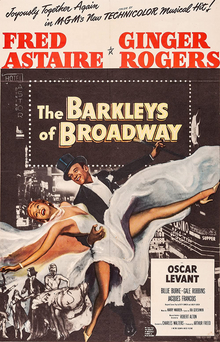
The Barkleys of Broadway is a 1949 American Technicolor musical comedy film from the Arthur Freed unit at Metro-Goldwyn-Mayer that reunited Fred Astaire and Ginger Rogers after ten years apart. Directed by Charles Walters, the screenplay is by Betty Comden, Adolph Green, and Sidney Sheldon, the songs are by Harry Warren (music) and Ira Gershwin (lyrics) with the addition of "They Can't Take That Away from Me" by George and Ira Gershwin, and the choreography was created by Robert Alton and Hermes Pan. Also featured in the cast were Oscar Levant, Billie Burke, Jacques François and Gale Robbins. It is the last film that Astaire and Rogers made together, and their only film together in color. Rogers came in as a last-minute replacement for Judy Garland, whose frequent absences due to a dependence on prescription medication cost her the role.

Ella Fitzgerald Sings the George and Ira Gershwin Song Book is a box set by American jazz singer Ella Fitzgerald that contains songs by George and Ira Gershwin with arrangements by Nelson Riddle. It was produced by Norman Granz, Fitzgerald's manager and the founder of Verve Records. Fifty-nine songs were recorded in the span of eight months in 1959. It is one of the eight album releases comprising what is possibly Fitzgerald's greatest musical legacy: Ella Fitzgerald Sings The Complete American Songbook, in which she recorded, with top arrangers and musicians, a comprehensive collection of both well-known and obscure songs from the Great American Songbook canon, written by the likes of Cole Porter, Rodgers & Hart, Irving Berlin, Duke Ellington, George and Ira Gershwin, Harold Arlen, Jerome Kern, and Johnny Mercer.

Shall We Dance is a 1937 American musical comedy film directed by Mark Sandrich. It is the seventh of the ten Fred Astaire-Ginger Rogers films. The story follows an American ballet dancer (Astaire) who falls in love with a tap dancer (Rogers); the tabloid press concocts a story of their marriage, after which life imitates art. George Gershwin wrote the symphonic underscore and Ira Gershwin the lyrics, for their second Hollywood musical.

Oscar Shaw was a stage and screen actor and singer, remembered primarily today for his role as Bob Adams in the first film starring the Marx Brothers, The Cocoanuts (1929). United States census records show that Shaw was already working as a stage actor in 1910, while still living with his mother, brother, and stepfather.
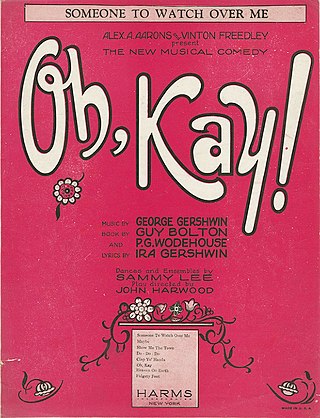
"Someone to Watch Over Me" is a 1926 song composed by George Gershwin with lyrics by Ira Gershwin, assisted by Howard Dietz who penned the title. It was written for the musical Oh, Kay! (1926), with the part originally sung on Broadway by English actress Gertrude Lawrence while holding a rag doll in a sentimental solo scene. The musical ran for more than 200 performances in New York and then saw equivalent acclaim in London in 1927, all with the song as its centerpiece. Lawrence released the song as a medium-tempo single which rose to #2 on the charts in 1927.

Lady Be Good is an MGM musical film released in 1941. The film stars dancer Eleanor Powell, along with Ann Sothern, Robert Young, Lionel Barrymore, and Red Skelton. It was directed by Norman Z. McLeod and produced by Arthur Freed. This was the first of several films Powell made with Skelton. Powell received top billing, but Sothern and Young are the main stars. They play, respectively, Dixie Donegan, a would-be lyricist, and Eddie Crane, a struggling composer.
"'S Wonderful" is a 1927 popular song composed by George Gershwin, with lyrics written by Ira Gershwin. It was introduced in the Broadway musical Funny Face (1927) by Adele Astaire and Allen Kearns.
"I've Got a Crush on You" is a song composed by George Gershwin, with lyrics by Ira Gershwin. It is unique among Gershwin compositions in that it was used for two different Broadway productions: Treasure Girl (1928), when it was introduced by Clifton Webb and Mary Hay, and Strike Up the Band (1930), when it was sung by Doris Carson and Gordon Smith. It was later included in the tribute musical Nice Work If You Can Get It (2012), in which it was sung by Jennifer Laura Thompson. When covered by Frank Sinatra he was a part of Columbia Records.

Girl Crazy is a 1932 American pre-Code musical film adaptation of the 1930 stage play of the same name. The film was very unlike the stage play except for its score. It was tailored for the comic talents of Wheeler & Woolsey, a popular comedy team of the time. Three songs written by George and Ira Gershwin for the play were retained: "Bidin' My Time", "I Got Rhythm", and "But Not for Me". According to RKO records, the film lost $150,000. Lon Chaney Jr. appears in the film (uncredited) as a dancer in the chorus.

Swing jazz emerged as a dominant form in American music, in which some virtuoso soloists became as famous as the band leaders. Key figures in developing the "big" jazz band included bandleaders and arrangers Count Basie, Cab Calloway, Jimmy and Tommy Dorsey, Duke Ellington, Benny Goodman, Fletcher Henderson, Earl Hines, Glenn Miller, and Artie Shaw. Duke Ellington and his band members composed numerous swing era hits that have become standards: "It Don't Mean a Thing " (1932), "Sophisticated Lady" (1933) and "Caravan" (1936), among others. Other influential bandleaders of this period were Benny Goodman and Count Basie.

Snowbound is a 1962 studio album by Sarah Vaughan, arranged by Don Costa.

Sarah Vaughan in Hi-Fi is a 12 track compilation album by Sarah Vaughan released in 1955 and recorded from December 21, 1949 to December 1952.
References
- ↑ William H. Young, Nancy K. Young Music of the Great Depression 2005 p.271 " "Blah, Blah, Blah" (1931; music by George Gershwin, lyrics by Ira Gershwin), "
- ↑ Caryl Brahms, Ned Sherrin Song by song: the lives and work of 14 great lyric writers 1984 p52 "The invitation inspired a quick dash to the trunk to unearth 'Blah, Blah, Blah', from the abortive East is West, a title song, ..."
- ↑ The Melody Lingers on: The Great Songwriters and Their Movie 1999 "Although one song, "Blah-Blah-Blah," was taken "out of the trunk," Gershwin worked hard on the others,"
- ↑ Sarah Kozloff Overhearing Film Dialogue 2000 p181 "Take George and Ira Gershwin's 1931 "Blah-Blah-Blah." Blah, Blah, Blah, blah moon, Blah, Blah, Blah above. Blah, Blah, Blah, blah croon, Blah, Blah, Blah, blah love.""
- ↑ Gerald Mast (1987). Can't Help Singin': The American Musical on Stage and Screen. Overlook Press. p. 70. ISBN 978-0-87951-283-5.